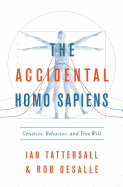
At the heart of the admirable and lucid The Accidental Homo Sapiens by Ian Tattersall and Rob DeSalle (A Natural History of Wine) is the effort to expose the flaws of reductive thinking that pervade both popular science and the hypotheses of rival scientists. These oversimplifications abound in writing about genes, evolution, culture and behavior.
On genes, the authors note that "most... influence more than one trait--while most character spectra... are influenced by many genes. Seeking one-to-one correspondences between protein-coding genes and specific phenotypic characteristics is thus for the most part a fool's errand." In particular, the authors argue that evolution acts on the individual, rather than the gene, contrary to Richard Dawkins (The Selfish Gene) and others.
Tattersall and DeSalle also challenge evolutionary psychology, stating that humans "are not, as some suppose, prisoners of a hypothetical Ice Age 'environment of evolutionary adaptation' that reflects itself in bizarre and inappropriate reactions to our changed modern circumstances." Essentially, human beings are not trapped by genetic destiny or evolution, but are individuals capable of making choices, for good or for ill.
Beyond arguing what humans are not, the authors establish what humans distinctly are: the only creatures to think symbolically and create private worlds in their heads. This thinking allows complex socialization, choice and flexibility, all within the frameworks of genes and environment.
Clear and pertinent digressions on the Homo family tree and statistics (without too much math) round out the work. --Evan M. Anderson, collection development librarian, Kirkendall Public Library, Ankeny, Iowa

